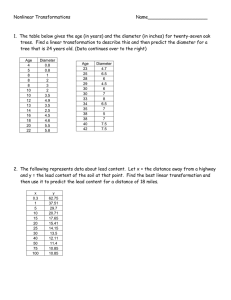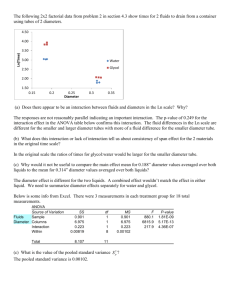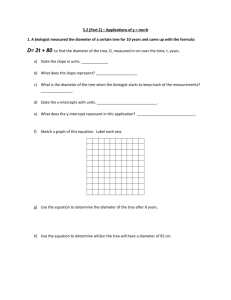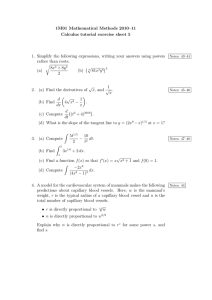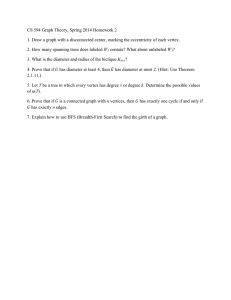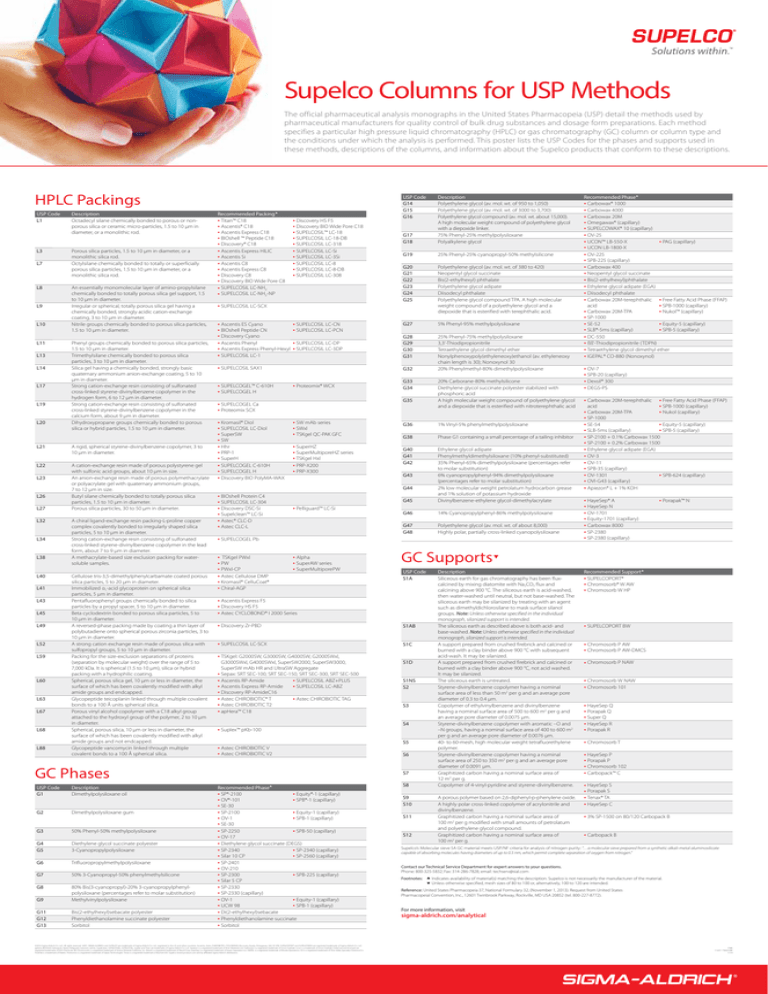
Supelco Columns for USP Methods
The official pharmaceutical analysis monographs in the United States Pharmacopeia (USP) detail the methods used by
pharmaceutical manufacturers for quality control of bulk drug substances and dosage form preparations. Each method
specifies a particular high pressure liquid chromatography (HPLC) or gas chromatography (GC) column or column type and
the conditions under which the analysis is performed. This poster lists the USP Codes for the phases and supports used in
these methods, descriptions of the columns, and information about the Supelco products that conform to these descriptions.
HPLC Packings
USP Code
L1
L3
L7
L8
L9
L10
L11
L13
L14
L17
L19
L20
Description
Octadecyl silane chemically bonded to porous or nonporous silica or ceramic micro-particles, 1.5 to 10 μm in
diameter, or a monolithic rod.
Porous silica particles, 1.5 to 10 μm in diameter, or a
monolithic silica rod.
Octylsilane chemically bonded to totally or superficially
porous silica particles, 1.5 to 10 μm in diameter, or a
monolithic silica rod.
An essentially monomolecular layer of amino-propylsilane
chemically bonded to totally porous silica gel support, 1.5
to 10 μm in diameter.
Irregular or spherical, totally porous silica gel having a
chemically bonded, strongly acidic cation-exchange
coating, 3 to 10 μm in diameter.
Nitrile groups chemically bonded to porous silica particles,
1.5 to 10 μm in diameter.
Phenyl groups chemically bonded to porous silica particles,
1.5 to 10 μm in diameter.
Trimethylsilane chemically bonded to porous silica
particles, 3 to 10 μm in diameter.
Silica gel having a chemically bonded, strongly basic
quaternary ammonium anion-exchange coating, 5 to 10
μm in diameter.
Strong cation-exchange resin consisting of sulfonated
cross-linked styrene-divinylbenzene copolymer in the
hydrogen form, 6 to 12 μm in diameter.
Strong cation-exchange resin consisting of sulfonated
cross-linked styrene-divinylbenzene copolymer in the
calcium form, about 9 μm in diameter.
Dihydroxypropane groups chemically bonded to porous
silica or hybrid particles, 1.5 to 10 μm in diameter.
L21
A rigid, spherical styrene-divinylbenzene copolymer, 3 to
10 μm in diameter.
L22
A cation-exchange resin made of porous polystyrene gel
with sulfonic acid groups, about 10 μm in size.
An anion-exchange resin made of porous polymethacrylate
or polyacrylate gel with quaternary ammonium groups,
7 to 12 μm in size.
Butyl silane chemically bonded to totally porous silica
particles, 1.5 to 10 μm in diameter.
Porous silica particles, 30 to 50 μm in diameter.
L23
L26
L27
L32
L34
L38
L40
L41
L43
L45
L49
L52
L59
L60
L63
L67
L68
L88
A chiral ligand-exchange resin packing-L-proline copper
complex covalently bonded to irregularly shaped silica
particles, 5 to 10 μm in diameter.
Strong cation-exchange resin consisting of sulfonated
cross-linked styrene-divinylbenzene copolymer in the lead
form, about 7 to 9 μm in diameter.
A methacrylate-based size exclusion packing for watersoluble samples.
Cellulose tris-3,5-dimethylphenylcarbamate coated porous
silica particles, 5 to 20 μm in diameter.
Immobilized α1-acid glycoprotein on spherical silica
particles, 5 μm in diameter.
Pentafluorophenyl groups chemically bonded to silica
particles by a propyl spacer, 5 to 10 μm in diameter.
Beta cyclodextrin bonded to porous silica particles, 5 to
10 μm in diameter.
A reversed-phase packing made by coating a thin layer of
polybutadiene onto spherical porous zirconia particles, 3 to
10 μm in diameter.
A strong cation exchange resin made of porous silica with
sulfopropyl groups, 5 to 10 μm in diameter.
Packing for the size-exclusion separations of proteins
(separation by molecular weight) over the range of 5 to
7,000 kDa. It is spherical (1.5 to 10 μm), silica or hybrid
packing with a hydrophilic coating.
Spherical, porous silica gel, 10 μm or less in diameter, the
surface of which has been covalently modified with alkyl
amide groups and endcapped.
Glycopeptide teicoplanin linked through multiple covalent
bonds to a 100 Å units spherical silica.
Porous vinyl alcohol copolymer with a C18 alkyl group
attached to the hydroxyl group of the polymer, 2 to 10 μm
in diameter.
Spherical, porous silica, 10 μm or less in diameter, the
surface of which has been covalently modified with alkyl
amide groups and not endcapped.
Glycopeptide vancomycin linked through multiple
covalent bonds to a 100 Å spherical silica.
Recommended Packing
• Titan™ C18
• Ascentis® C18
• Ascentis Express C18
• BIOshell ™ Peptide C18
• Discovery® C18
• Ascentis Express HILIC
• Ascentis Si
• Ascentis C8
• Ascentis Express C8
• Discovery C8
• Discovery BIO Wide Pore C8
• SUPELCOSIL LC-NH2
• SUPELCOSIL LC-NH2-NP
• Discovery HS F5
• Discovery BIO Wide Pore C18
• SUPELCOSIL™ LC-18
• SUPELCOSIL LC-18-DB
• SUPELCOSIL LC-318
• SUPELCOSIL LC-Si
• SUPELCOSIL LC-3Si
• SUPELCOSIL LC-8
• SUPELCOSIL LC-8-DB
• SUPELCOSIL LC-308
Description
Dimethylpolysiloxane oil
G2
Dimethylpolysiloxane gum
G3
50% Phenyl-50% methylpolysiloxane
G4
G5
Diethylene glycol succinate polyester
3-Cyanopropylpolysiloxane
G6
Trifluoropropylmethylpolysiloxane
G7
50% 3-Cyanopropyl-50% phenylmethylsilicone
G8
G9
80% Bis(3-cyanopropyl)-20% 3-cyanopropylphenylpolysiloxane (percentages refer to molar substitution)
Methylvinylpolysiloxane
G11
G12
G13
Bis(2-ethylhexyl)sebacate polyester
Phenyldiethanolamine succinate polyester
Sorbitol
G17
G18
Description
Polyethylene glycol (av. mol. wt. of 950 to 1,050)
Polyethylene glycol (av. mol. wt. of 3000 to 3,700)
Polyethylene glycol compound (av. mol. wt. about 15,000).
A high molecular weight compound of polyethylene glycol
with a diepoxide linker.
75% Phenyl-25% methylpolysiloxane
Polyalkylene glycol
G19
25% Phenyl-25% cyanopropyl-50% methylsilicone
G20
G21
G22
G23
G24
G25
Polyethylene glycol (av. mol. wt. of 380 to 420)
Neopentyl glycol succinate
Bis(2-ethylhexyl) phthalate
Polyethylene glycol adipate
Diisodecyl phthalate
Polyethylene glycol compound TPA. A high molecular
weight compound of a polyethylene glycol and a
diepoxide that is esterified with terephthalic acid.
• SUPELCOSIL LC-SCX
• Ascentis ES Cyano
• SUPELCOSIL LC-CN
• BIOshell Peptide CN
• SUPELCOSIL LC-PCN
• Discovery Cyano
• Ascentis Phenyl
• SUPELCOSIL LC-DP
• Ascentis Express Phenyl-Hexyl • SUPELCOSIL LC-3DP
SUPELCOSIL
LC-1
•
G27
5% Phenyl-95% methylpolysiloxane
G28
G29
G30
G31
• SUPELCOSIL SAX1
G32
25% Phenyl-75% methylpolysiloxane
3,3’-Thiodipropionitrile
Tetraethylene glycol dimethyl ether
Nonylphenoxypoly(ethyleneoxy)ethanol (av. ethyleneoxy
chain length is 30); Nonoxynol 30
20% Phenylmethyl-80% dimethylpolysiloxane
• SUPELCOGEL™ C-610H
• SUPELCOGEL H
• Proteomix® WCX
• Kromasil® Diol
• SUPELCOSIL LC-Diol
• SuperSW
• SW
• Hhr
• PRP-1
• SuperH
• SUPELCOGEL C-610H
• SUPELCOGEL H
• Discovery BIO PolyMA-WAX
G33
G34
G35
• SUPELCOGEL Ca
• Proteomix SCX
• SW mAb series
• SWxl
• TSKgel QC-PAK GFC
• SuperHZ
• SuperMultiporeHZ series
• TSKgel Hxl
• PRP-X200
• PRP-X300
G36
• Pelliguard™ LC-Si
20% Carborane-80% methylsilicone
Diethylene glycol succinate polyester stabilized with
phosphoric acid
A high molecular weight compound of polyethylene glycol
and a diepoxide that is esterified with nitroterephthalic acid
1% Vinyl-5% phenylmethylpolysiloxane
G38
Phase G1 containing a small percentage of a tailing inhibitor
G40
G41
G42
G45
Ethylene glycol adipate
Phenylmethyldimethylsiloxane (10% phenyl-substituted)
35% Phenyl-65% dimethylpolysiloxane (percentages refer
to molar substitution)
6% cyanopropylphenyl-94% dimethylpolysiloxane
(percentages refer to molar substitution)
2% low molecular weight petrolatum hydrocarbon grease
and 1% solution of potassium hydroxide
Divinylbenzene-ethylene glycol-dimethylacrylate
G46
14% Cyanopropylphenyl-86% methylpolysiloxane
G47
G48
Polyethylene glycol (av. mol. wt. of about 8,000)
Highly polar, partially cross-linked cyanopolysiloxane
G43
G44
• BIOshell Protein C4
• SUPELCOSIL LC-304
• Discovery DSC-Si
• Supelclean™ LC-Si
• Astec® CLC-D
• Astec CLC-L
• SUPELCOGEL Pb
• TSKgel PWxl
• PW
• PWxl-CP
• Astec Cellulose DMP
• Kromasil® CelluCoat®
• Chiral-AGP
• Alpha
• SuperAW series
• SuperMultiporePW
USP Code
S1A
• Discovery Zr-PBD
S1AB
• SUPELCOSIL LC-SCX
S1C
• TSKgel: G2000SW, G3000SW, G4000SW, G2000SWxl,
G3000SWxl, G4000SWxl, SuperSW2000, SuperSW3000,
SuperSW mAb HR and UltraSW Aggregate
• Sepax: SRT SEC-100, SRT SEC-150, SRT SEC-300, SRT SEC-500
• Ascentis RP-Amide
• SUPELCOSIL ABZ+PLUS
• Ascentis Express RP-Amide • SUPELCOSIL LC-ABZ
• Discovery RP-AmideC16
• Astec CHIROBIOTIC® T
• Astec CHIROBIOTIC TAG
• Astec CHIROBIOTIC T2
• apHera™ C18
S1D
S1NS
S2
S3
S4
• Suplex™ pKb-100
S5
• Astec CHIROBIOTIC V
• Astec CHIROBIOTIC V2
S6
S7
Recommended Phase
• SP®-2100
• Equity®-1 (capillary)
• OV®-101
• SPB®-1 (capillary)
• SE-30
• SP-2100
• Equity-1 (capillary)
• OV-1
• SPB-1 (capillary)
• SE-30
• SP-2250
• SPB-50 (capillary)
• OV-17
• Diethylene glycol succinate (DEGS)
• SP-2340
• SP-2340 (capillary)
• Silar 10 CP
• SP-2560 (capillary)
• SP-2401
• OV-210
• SP-2300
• SPB-225 (capillary)
• Silar 5 CP
• SP-2330
• SP-2330 (capillary)
• OV-1
• Equity-1 (capillary)
• UCW 98
• SPB-1 (capillary)
• Di(2-ethylhexyl)sebacate
• Phenyldiethanolamine succinate
• Sorbitol
©2014 Sigma-Aldrich Co. LLC. All rights reserved. SAFC, SIGMA-ALDRICH and SUPELCO are trademarks of Sigma-Aldrich Co. LLC, registered in the US and other countries. Ascentis, Astec, CHIROBIOTIC, CYCLOBOND, Discovery, Equity, Omegawax, SLB, SP, SPB, SUPELCOPORT and SUPELCOWAX are registered trademarks of Sigma-Aldrich Co. LLC.
apHera, BIOShell, Carbopack, Nukol, Pelliguard, Solutions within, Supelclean, SUPELCOGEL, SUPELCOSIL, Suplex and Titan are trademarks of Sigma-Aldrich Co. LLC. Apiezon is a registered trademark of M & I Materials Ltd. Carbowax is a registered trademark of Union Carbide. Ucon is a trademark of Union Carbide. CelluCoat and Kromasil are
registered trademarks of EKA Chemicals AB. Chromosorb is a registered trademark of Imerys Minerals California, Inc. Dexsil is a registered trademark of Dexsil Corp. HayeSep is a registered trademark of Hayes Separation Inc. IGEPAL is a registered trademark of Rhodia Operations. OV is a registered trademark of Ohio Valley Specialty Chemical Co.
PoraPak is a trademark of Waters. Proteomix is a registered trademark of Sepax Technologies. Tenax is a registered trademark of Buchem B.V. Supelco brand products are sold by affiliated Sigma-Aldrich distributors.
Recommended Phase
• Carbowax® 1000
• Carbowax 4000
• Carbowax 20M
• Omegawax® (capillary)
• SUPELCOWAX® 10 (capillary)
• OV-25
• UCON™ LB-550-X
• PAG (capillary)
• UCON LB-1800-X
• OV-225
• SPB-225 (capillary)
• Carbowax 400
• Neopentyl glycol succinate
• Bis(2-ethylhexyl)phthalate
• Ethylene glycol adipate (EGA)
• Diisodecyl phthalate
• Carbowax 20M-terephthalic • Free Fatty Acid Phase (FFAP)
acid
• SPB-1000 (capillary)
• Carbowax 20M-TPA
• Nukol™ (capillary)
• SP-1000
• SE-52
• Equity-5 (capillary)
• SLB®-5ms (capillary)
• SPB-5 (capillary)
• DC-550
• ßß’-Thiodipropionitrile (TDPN)
• Tetraethylene glycol dimethyl ether
• IGEPAL® CO-880 (Nonoxynol)
• OV-7
• SPB-20 (capillary)
• Dexsil® 300
• DEGS-PS
• Carbowax 20M-terephthalic • Free Fatty Acid Phase (FFAP)
acid
• SPB-1000 (capillary)
• Carbowax 20M-TPA
• Nukol (capillary)
• SP-1000
• SE-54
• Equity-5 (capillary)
• SLB-5ms (capillary)
• SPB-5 (capillary)
• SP-2100 + 0.1% Carbowax 1500
• SP-2100 + 0.2% Carbowax 1500
• Ethylene glycol adipate (EGA)
• OV-3
• OV-11
• SPB-35 (capillary)
• OV-1301
• SPB-624 (capillary)
• OVI-G43 (capillary)
• Apiezon® L + 1% KOH
• HayeSep® A
• HayeSep N
• OV-1701
• Equity-1701 (capillary)
• Carbowax 8000
• SP-2380
• SP-2380 (capillary)
• Porapak™ N
GC Supports
• Ascentis Express F5
• Discovery HS F5
• Astec CYCLOBOND® I 2000 Series
GC Phases
USP Code
G1
USP Code
G14
G15
G16
S8
S9
S10
S11
S12
Description
Siliceous earth for gas chromatography has been fluxcalcined by mixing diatomite with Na2CO3 flux and
calcining above 900 °C. The siliceous earth is acid-washed,
then water-washed until neutral, but not base-washed. The
siliceous earth may be silanized by treating with an agent
such as dimethyldichlorosilane to mask surface silanol
groups. Note: Unless otherwise specified in the individual
monograph, silanized support is intended.
The siliceous earth as described above is both acid- and
base-washed. Note: Unless otherwise specified in the individual
monograph, silanized support is intended.
A support prepared from crushed firebrick and calcined or
burned with a clay binder above 900 °C with subsequent
acid-wash. It may be silanized.
A support prepared from crushed firebrick and calcined or
burned with a clay binder above 900 °C, not acid washed.
It may be silanized.
The siliceous earth is untreated.
Styrene-divinylbenzene copolymer having a nominal
surface area of less than 50 m2 per g and an average pore
diameter of 0.3 to 0.4 μm.
Copolymer of ethylvinylbenzene and divinylbenzene
having a nominal surface area of 500 to 600 m2 per g and
an average pore diameter of 0.0075 μm.
Styrene-divinylbenzene copolymer with aromatic –O and
–N groups, having a nominal surface area of 400 to 600 m2
per g and an average pore diameter of 0.0076 μm.
40- to 60-mesh, high molecular weight tetrafluorethylene
polymer.
Styrene-divinylbenzene copolymer having a nominal
surface area of 250 to 350 m2 per g and an average pore
diameter of 0.0091 μm.
Graphitized carbon having a nominal surface area of
12 m2 per g.
Copolymer of 4-vinyl-pyridine and styrene-divinylbenzene.
A porous polymer based on 2,6-diphenyl-p-phenylene oxide.
A highly polar cross-linked copolymer of acrylonitrile and
divinylbenzene.
Graphitized carbon having a nominal surface area of
100 m2 per g modified with small amounts of petrolatum
and polyethylene glycol compound.
Graphitized carbon having a nominal surface area of
100 m2 per g.
Recommended Support
• SUPELCOPORT®
• Chromosorb® W AW
• Chromosorb W HP
• SUPELCOPORT BW
• Chromosorb P AW
• Chromosorb P AW-DMCS
• Chromosorb P NAW
• Chromosorb W NAW
• Chromosorb 101
• HayeSep Q
• Porapak Q
• Super Q
• HayeSep R
• Porapak R
• Chromosorb T
• HayeSep P
• Porapak P
• Chromosorb 102
• Carbopack™ C
• HayeSep S
• Porapak S
• Tenax® TA
• HayeSep C
• 3% SP-1500 on 80/120 Carbopack B
• Carbopack B
Supelco’s Molecular sieve 5A GC material meets USP/NF criteria for analysis of nitrogen purity: “…a molecular sieve prepared from a synthetic alkali-metal aluminosilicate
capable of absorbing molecules having diameters of up to 0.5 nm, which permit complete separation of oxygen from nitrogen.”
Contact our Technical Service Department for expert answers to your questions.
Phone: 800-325-5832; Fax: 314-286-7828; email: techserv@sial.com
Footnotes: Indicates availability of material(s) matching the description. Supelco is not necessarily the manufacturer of the material.
Unless otherwise specified, mesh sizes of 80 to 100 or, alternatively, 100 to 120 are intended.
Reference: United States Pharmacopeia 37, National Formulary 32, (November 1, 2013). Request from United States
Pharmacopeial Convention, Inc., 12601 Twinbrook Parkway, Rockville, MD USA 20852 (tel. 800-227-8772).
For more information, visit
sigma-aldrich.com/analytical
FWK
11237 / T403109E
1114

